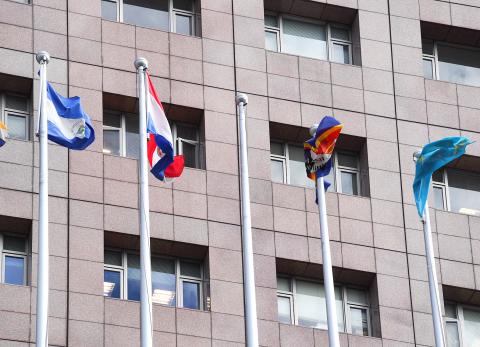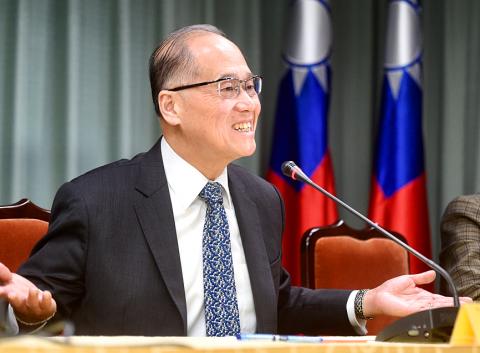The government yesterday expressed its regret over Sao Tome and Principe’s decision to cut its 19-year-old diplomatic ties with Taiwan, acknowledging that “gambling behavior” by the African nation was prompted by Taipei’s denial of its request for an exorbitant amount of financial aid.
Speaking at an impromptu news conference in Taipei, Minister of Foreign Affairs David Lee (李大維) said that to safeguard the nation’s dignity, Taiwan would immediately cut its diplomatic ties with Sao Tome and Principe, shutter its embassy and halt any cooperative programs with the African nation.
“Since the establishment of diplomatic ties in May 1997, Taipei has assisted Sao Tome and Principe in promoting national development, with our bilateral cooperation touching upon the areas of public health, medicine, agriculture, basic infrastructure, energy and education,” Lee said.

Photo: CNA
Singling out Taiwan’s antimalarial scheme in the African nation, Lee said thanks to continuous efforts by Taiwan’s malaria prevention counseling delegation, malaria incidence in Sao Tome and Principe fell from 50 percent in 2003 to 1.01 percent last year.
Despite Taipei’s determination to do its utmost to help its diplomatic allies promote national development, Lee said Sao Tome and Principe’s financial hole is simply too deep for Taiwan to deal with.
“Accordingly, it disregarded its nearly 20-year friendship with us and approached both sides of the Taiwan Strait to seek the highest bidder. We regret and deplore Sao Tome and Principe’s reckless and unfriendly decision,” Lee said.

Photo: Chien Jung-fong, Taipei Times
He added that the incident would not cease Taipei’s resolve to expand the nation’s international space and push its “steadfast diplomacy.”
Asked to confirm media reports that Sao Tome and Principe had asked the government for NT$6.4 billion (US$199.9 million), Lee declined to reveal the actual amount.
“It did ask for an astronomical number, but we refused to play the checkbook-diplomacy game,” Lee said.
“We would rather initiate programs that actually improve the welfare of the people of Sao Tome and Principe. The African nation’s need for money to fill its financial hole is neither Taiwan’s responsibility, nor is it something we are willing to do,” Lee added.
Asked whether Beijing had attempted to lure Sao Tome and Principe with money, Lee said the government did not have that information, but it was regrettable that Beijing would take advantage of the African nation’s financial position to consolidate its “one China” principle.
Lee also denied the severance of ties was due to the President Tsai Ing-wen’s (蔡英文) refusal to adhere to the so-called “1992 consensus,” which refers to a tacit understanding between the Chinese Nationalist Party (KMT) and the Chinese Communist Party that both sides of the Taiwan Strait acknowledge there is “one China,” with each side having its own interpretation of what “China” means.
“Frankly speaking, if we look at the case of the Gambia, which broke its diplomatic ties with Taiwan in November 2013 and established a formal relationship with Beijing in March this year, that all occurred when the precondition of the ‘1992 consensus’ was met,” Lee said, referring to then-president Ma Ying-jeou’s (馬英九) adherence to the “1992 consensus.”
On the possibility that a domino effect could be set off with the nation’s other diplomatic allies, particularly the Vatican, Lee said given the nation’s diplomatic situation, that pressure would be omnipresent.
Nevertheless, the Vatican, unlike secular nations, does not require financial aid, Lee said.
Meanwhile, the Mainland Affairs Council yesterday issued a strongly worded statement denouncing Beijing resorting to “checkbook diplomacy” in attempting to reinforce its “one China” policy and inducing Sao Tome and Principe to cut diplomatic ties with Taiwan.
“We hereby express our strong discontent and regret over the incident, which has hurt the feelings of Taiwanese, destabilized the Taiwan Strait and runs counter to Beijing’s oft-stated goal of pushing for the peaceful development of cross-strait relations,” the council said.
Stressing that the government has repeatedly demonstrated its goodwill since the Tsai administration took office in May, the council said it disapproved of China’s rigid mindset and its return to the “old path of confrontation,” urging Beijing to solemnly contemplate the possible consequences of its actions.

CHAOS: Iranians took to the streets playing celebratory music after reports of Khamenei’s death on Saturday, while mourners also gathered in Tehran yesterday Iranian Supreme Leader Ayatollah Ali Khamenei was killed in a major attack on Iran launched by Israel and the US, throwing the future of the Islamic republic into doubt and raising the risk of regional instability. Iranian state television and the state-run IRNA news agency announced the 86-year-old’s death early yesterday. US President Donald Trump said it gave Iranians their “greatest chance” to “take back” their country. The announcements came after a joint US and Israeli aerial bombardment that targeted Iranian military and governmental sites. Trump said the “heavy and pinpoint bombing” would continue through the week or as long

TRUST: The KMT said it respected the US’ timing and considerations, and hoped it would continue to honor its commitments to helping Taiwan bolster its defenses and deterrence US President Donald Trump is delaying a multibillion-dollar arms sale to Taiwan to ensure his visit to Beijing is successful, a New York Times report said. The weapons sales package has stalled in the US Department of State, the report said, citing US officials it did not identify. The White House has told agencies not to push forward ahead of Trump’s meeting with Chinese President Xi Jinping (習近平), it said. The two last month held a phone call to discuss trade and geopolitical flashpoints ahead of the summit. Xi raised the Taiwan issue and urged the US to handle arms sales to

State-run CPC Corp, Taiwan (CPC, 台灣中油) yesterday said that it had confirmed on Saturday night with its liquefied natural gas (LNG) and crude oil suppliers that shipments are proceeding as scheduled and that domestic supplies remain unaffected. The CPC yesterday announced the gasoline and diesel prices will rise by NT$0.2 and NT$0.4 per liter, respectively, starting Monday, citing Middle East tensions and blizzards in the eastern United States. CPC also iterated it has been reducing the proportion of crude oil imports from the Middle East and diversifying its supply sources in the past few years in response to geopolitical risks, expanding

An Emirates flight from Dubai arrived at Taiwan Taoyuan International Airport yesterday afternoon, the first service of the airline since the US and Israel launched strikes against Iran on Saturday. Flight EK366 took off from the United Arab Emirates (UAE) at 3:51am yesterday and landed at 4:02pm before taxiing to the airport’s D6 gate at Terminal 2 at 4:08pm, data from the airport and FlightAware, a global flight tracking site, showed. Of the 501 passengers on the flight, 275 were Taiwanese, including 96 group tour travelers, the data showed. Tourism Administration Deputy Director-General Huang He-ting (黃荷婷) greeted Taiwanese passengers at the airport and